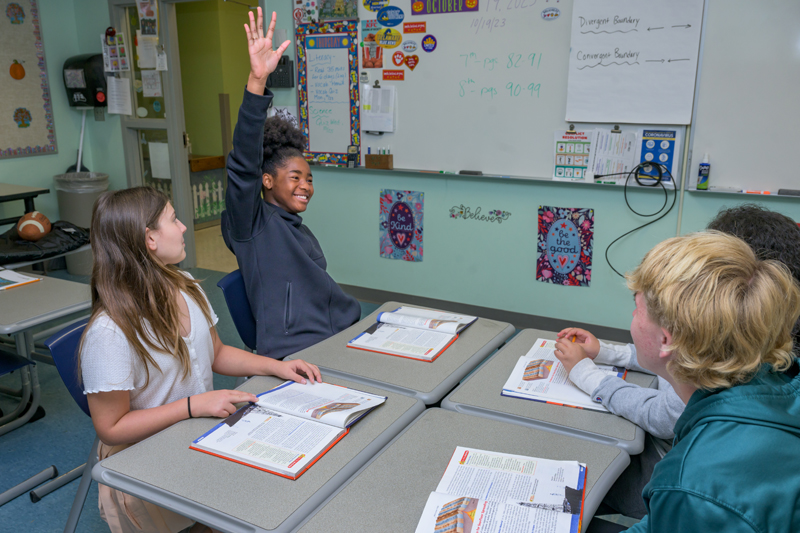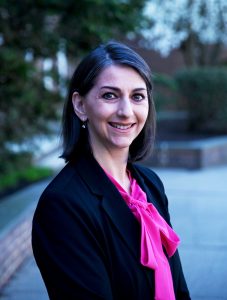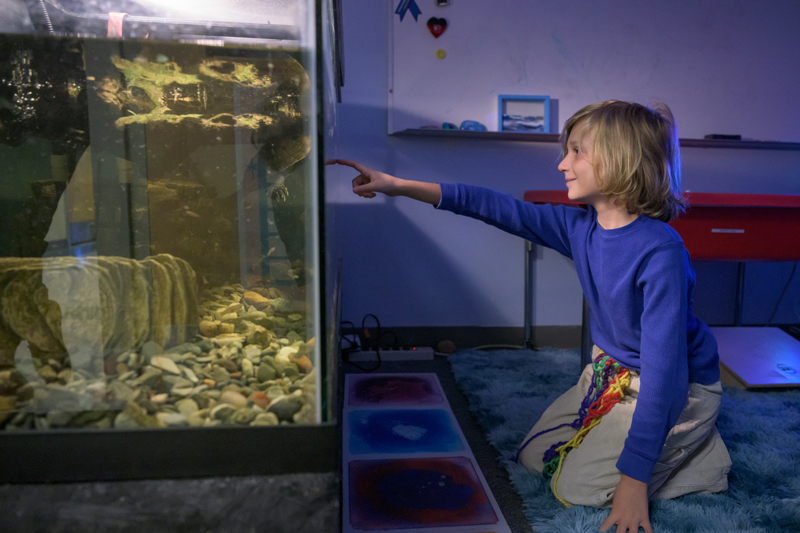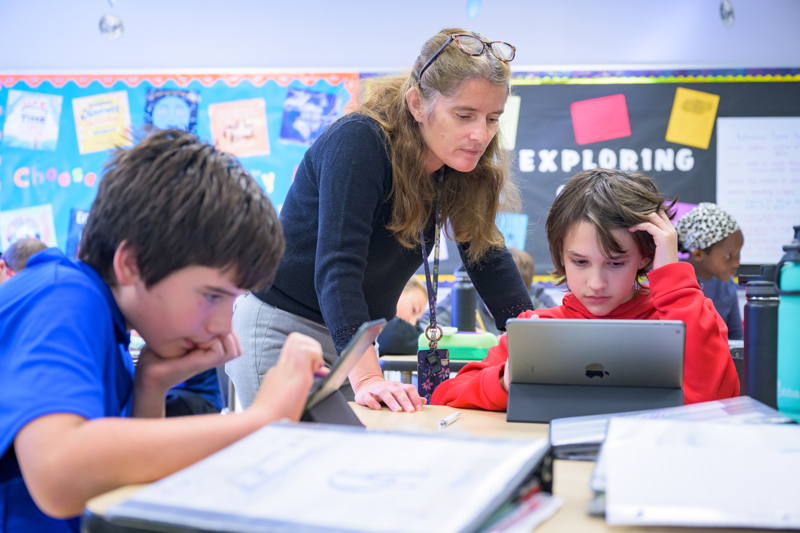Fostering Student Success

UD’s College School helps students with learning differences thrive with an engaging, research-based program
April 22, 2024
For more than 35 years, the University of Delaware’s The College School, housed within the College of Education and Human Development (CEHD), has served children with learning differences in grades 1 through 8. Its dedicated teachers and staff provide a rich, engaging and research-based curriculum, supporting their students’ academic and social-emotional growth. Located on CEHD’s Children’s Campus, it also complements the Early Learning Center and the Lab School, which serve infants and children through age 5. Andrea Glowatz, director of The College School, shared her thoughts on fostering student success, the value of the school’s relationship with UD and the exciting student projects underway. This article is the first of a three-part series with our CEHD Children’s Campus directors.

The College School creates an environment where bright students who learn differently thrive. Can you tell us more about the school’s approach? Glowatz: There is an ever-increasing number of students who do not maximize their learning in a traditional classroom setting. These challenges in many cases have nothing to do with students’ cognitive abilities. That’s a fancy way of saying that there are bright students out there in traditional classroom settings who are not learning or not learning well. The College School is a place where these students can come to thrive. At The College School, we believe that there is a moral imperative to individualize instruction. That means we’re meeting students where they are. Our master teachers deliver a research-based program that is warm, personalized, resourceful and academically inclined with therapeutic interventions available. We make sure every child is safe, loved and educated. And our classes are generally capped at 12 students with a 4:1 teacher-student ratio so that every student receives more individualized attention. We also believe that success breeds success. A lot of our students feel like they’re out of place in a traditional classroom and they begin to conjure an unhealthy narrative about themselves — that they are not enough, that they are not bright enough. At The College School, students get a taste of what it means to be successful and before long, they’re changing that narrative. What is a ‘learning difference?’ Glowatz: A learning difference is anything that interrupts the flow of learning. Many students — as many as 25% of the population — have something that is interrupting a neuro-motor construct that is necessary for learning, even though there is nothing wrong with them cognitively. Clinically speaking, there are various learning disabilities, behavior disorders and emotional disorders that can affect learning. But even though those labels help us understand a child, it really doesn’t matter what the label is. A learning disability is not a learning inability. We know that empirically at The College School and that is one of the most important ideas I can promote. For example, most readers — those without learning differences — read using a part of the brain called the angular gyrus. But researchers have found through MRI imaging and other studies that many dyslexic students access the prefrontal cortex in order to read. They’re using a different part of the brain, so they may need a reading program that taps a different part of the brain. For this reason, our reading program is multisensory — it uses all of the senses, including hand signals. For these students, the movements make all the difference because the movements enhance memory.

How do you make use of UD’s research? Glowatz: Our curriculum incorporates the research findings of faculty across UD, from education and human development to the health sciences. Our sixth-grade math curriculum, for example, is based on the research conducted by Nancy Jordan, Dean Family Endowed Chair of Education and professor in CEHD, and Nancy Dyson, research associate in CEHD. They developed a new approach to teaching fractions based on their research on predicting and addressing elementary and middle school students’ difficulties with fractions. And with this approach, we’ve seen an increase in our sixth graders’ conceptual understanding of fractions. There are other research studies and special programs in partnership with CEHD’s School of Education currently underway at The College School. In addition to the faculty and graduate students who conduct research, many of our undergraduate students in teacher education also complete their field experiences here. I think it’s worth noting that the best strategies for working with students who learn differently are the best strategies for all students. Our doors are wide open to any faculty or graduate students from CEHD or across UD who would like to work with our students. What are some of the unique projects or classroom activities at The College School? Glowatz: Every day in the classroom, I see inquiry-based learning at its finest. Kids are designing, testing and building things constantly. For example, in the STEAM [science, technology, engineering, arts and math] room, a teacher might give the students a penny and then ask, “How many pennies do you think you’d need to make a stack that is one mile tall?” As part of the investigation, they take a look at the penny, they talk to each other to devise a plan, and they apply their mathematics knowledge to make that estimate. In our classrooms, kids are interacting with one another, they’re asking each other questions, and they’re challenging each other’s thoughts — all crucial skills to cultivate for their next phase of education.

Recently, our students built a scale model of the solar system throughout the building. There are paper planets on the walls in different locations of the building based on their actual distance from the sun. This project complemented a solar system walk that the kids did on UD’s campus. That’s another extraordinary benefit to attending The College School — kids have access to so many resources that are unique to a university setting, from attending exhibitions to hearing from scientists across UD’s many colleges to interacting with student clubs on campus. In addition to our master teachers, occupational therapist, speech-language pathologist and school counselor, we also have a music and movement teacher who happens to be a classically trained opera singer. She introduced the kids to opera and talked to them about how this type of music is found in popular culture, showing them different clips of movies and commercials where opera music is played. Making those real-world connections happens in every good classroom, and it’s happening here at The College School in very exciting ways. What are some of your goals for 2024? Glowatz: We’re really excited to revitalize our summer camps and get those programs off the ground again this year. Looking ahead to the future, I’d also love to implement a program centered on information literacy, teaching children to evaluate and interrogate news articles and other forms of media. If we train children from the time they’re very young to evaluate the information they receive, then we can build on those skills each year and help them draw informed conclusions about the information they consume. And what better place to do this than at a university, because we’re here to understand and explore free thought and ideas. To learn more about The College School or enroll your child, visit its website. Read this story on UDaily. Article by Jessica Henderson. Photos by Evan Krape and courtesy of Andrea Glowatz.



